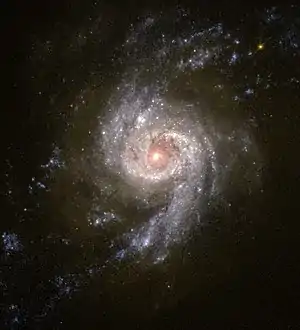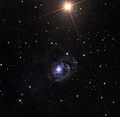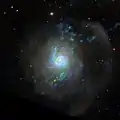NGC 3310
NGC 3310 is a grand design spiral galaxy in the constellation Ursa Major. It is a starburst galaxy and it is likely that NGC 3310 collided with one of its satellite galaxies about 100 million years ago, triggering widespread star formation. It is thought to be located approximately 46 million light-years away from the Earth, and is thought to be about 22,000 light-years wide.
| NGC 3310 | |
|---|---|
 NGC 3310, as taken by Hubble Space Telescope | |
| Observation data (J2000 epoch) | |
| Constellation | Ursa Major |
| Right ascension | 10h 38m 45.857s[1] |
| Declination | +53° 30′ 11.89″[1] |
| Redshift | 0.003309[2] |
| Distance | 34.8 Mly (10.66 Mpc)[2] |
| Apparent magnitude (V) | 11.2[3] |
| Characteristics | |
| Type | SAB(r)bc pec[3] or SAcd[2] |
| Apparent size (V) | 3′.1 × 2′.4[3] |
| Other designations | |
| UGC 5786, PGC 31650, Arp 217, VV 356, VV 406[3] | |
The ring clusters of NGC 3310 have been undergoing starburst activity for at least the last 40 million years.[4]
Image gallery
 NGC 3310 from the Mount Lemmon Observatory
NGC 3310 from the Mount Lemmon Observatory
References
- Skrutskie, M. F.; et al. (February 2006), "The Two Micron All Sky Survey (2MASS)", The Astronomical Journal, 131 (2): 1163–1183, Bibcode:2006AJ....131.1163S, doi:10.1086/498708
- Ann, H. B.; et al. (2015), "A Catalog of Visually Classified Galaxies in the Local (z ∼ 0.01) Universe", The Astrophysical Journal Supplement Series, 217 (2): 27–49, arXiv:1502.03545, Bibcode:2015ApJS..217...27A, doi:10.1088/0067-0049/217/2/27, S2CID 119253507.
- "NASA/IPAC Extragalactic Database". Results for NGC 3310. Retrieved 2006-11-08.
- de Grijs, R.; Anders, P.; Bastian, N.; Lynds, R.; et al. (2003). "Star cluster formation and evolution in nearby starburst galaxies - II. Initial conditions". Monthly Notices of the Royal Astronomical Society. 343 (4): 1285–1300. arXiv:astro-ph/0305184. Bibcode:2003MNRAS.343.1285D. doi:10.1046/j.1365-8711.2003.06777.x. S2CID 16174497.
External links
 Media related to NGC 3310 at Wikimedia Commons
Media related to NGC 3310 at Wikimedia Commons- NASA Astronomy Picture of the Day: Spiral Galaxy NGC 3310 Across the Visible (11 September 2001)
- Hubble's Ultraviolet Views of Nearby Galaxies Yield Clues to Early Universe
- The Scale of the Universe (Astronomy Picture of the Day 2012 March 12)
This article is issued from Wikipedia. The text is licensed under Creative Commons - Attribution - Sharealike. Additional terms may apply for the media files.